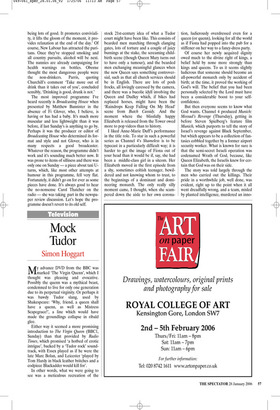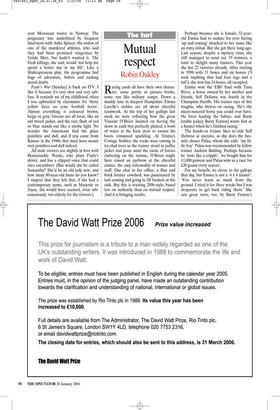Mock Tudor
Simon Hoggart
My advance DVD from the BBC was marked ‘The Virgin Quenn’, which I thought was pleasing and evocative. Possibly the quenn was a mythical beast, condemned to live for only one generation due to its perpetual virginity. Or perhaps it was bawdy Tudor slang, used by Shakespeare: ‘Why, friend, a queen shall have a quenn, as well as Mistress Scapegrace!’, a line which would have made the groundlings collapse in ribald glee.
Either way it seemed a more promising introduction to The Virgin Queen (BBC1, Sunday) than that provided by Radio Times, which promised ‘a hotbed of erotic intrigue’, backed by a ‘Tudor rock’ soundtrack, with Essex played as if he were the late Marc Bolan, and Leicester ‘played by Tom Hardy in black leather britches and a codpiece Blackadder would kill for’.
In other words, what we were going to see was a meticulous recreation of the stock 21st-century idea of what a Tudor court might have been like. This consists of bearded men marching through clanging gates, lots of torture and a couple of juicy burnings at the stake, the screaming childbirth scene (though Queen Mary turns out to have only a tumour), and the bearded men exchanging meaningful glances when the new Queen says something controversial, such as that all church services should be in English. There are lots of posh frocks, all lovingly caressed by the camera, and there was a bucolic idyll involving the Queen and Dudley which, if bikes had replaced horses, might have been the ‘Raindrops Keep Falling On My Head’ scene from Butch Cassidy. And the moment where the blissfully happy Elizabeth is released from the Tower owed more to pop videos than to history.
I liked Anne-Marie Duff’s performance in the title role. To star in such a powerful series as Channel 4’s Shameless is to be typecast in a particularly difficult way; it is harder to get the image of Fiona out of your head than it would be if, say, she had been a middle-class girl in a sitcom. Her Elizabeth moved in the first episode from a shy, sometimes coltish teenager, bewildered and not knowing whom to trust, to the beginnings of a dominant and domineering monarch. The only really silly moment came, I thought, when she scampered down the aisle to her own corona tion, ludicrously overdressed even for a queen (or quenn), looking for all the world as if Fiona had popped into the pub for a stiffener on her way to a fancy-dress party.
Of course her newly acquired dignity owed much to the divine right of kings, a belief held by none more strongly than kings and queens. To us it seems slightly ludicrous that someone should become an all-powerful monarch only by accident of birth; at the time, it proved the working of God’s will. The belief that you had been personally selected by the Lord must have been a considerable boost to your selfconfidence.
But then everyone seems to know what God wants. Channel 4 produced Munich: Mossad’s Revenge (Thursday), getting in before Steven Spielberg’s feature film Munich, which purports to tell the story of Israel’s revenge against Black September, but which appears to be a collection of fantasies cobbled together by a former airport security worker. What is known for sure is that the semi-secret Israeli operation was codenamed Wrath of God, because, like Queen Elizabeth, the Israelis knew for certain that God was on their side.
The story was told largely through the men who carried out the killings. Their pride in a worthwhile job, well done, was evident, right up to the point when it all went dreadfully wrong, and a team, misled by planted intelligence, murdered an inno cent Moroccan waiter in Norway. The poignancy was underlined by frequent interviews with Anka Spitzer, the widow of one of the murdered athletes, who said they had been promised vengeance by Golda Meir, but hadn’t wanted it. The fresh killings, she said, would ‘not help me spend a better day in my life’. Like a Shakespearean play, the programme had bags of adventure, hubris and racking moral doubt.
Foyle’s War (Sunday) is back on ITV. I like it because it’s very slow and very subfusc. It reminds me of my childhood, when I was upbraided by classmates for ‘those yellow laces on your football boots’. Almost everything is coloured brown, beige or grey. Greens are all lovat, like an old tweed jacket, and the rare flash of red or blue stands out like a strobe light. No wonder the Americans find the place pointless and dull, and if you came from Kansas in the 1940s that must have meant very pointless and dull indeed.
All male viewers are slightly in love with Honeysuckle Weeks, who plays Foyle’s driver, and has a clipped voice that could slice cucumbers. (But would she be called Samantha? She’d be an old lady now, and how many 80-year-old Sams do you know? I suspect that they felt that, if she had a contemporary name, such as Marjorie or Joyce, she would have seemed, even subconsciously, too elderly for the viewers.)























































 Previous page
Previous page